Carlos Santamaría: science and conscience
This man, born in San Sebastian on December 25, 1999, opened his doors and invited us to enter the work room. The room was not large and there were no bright colors. The light itself was not of great intensity and most of his books on the shelf were not recent. When we sat in the chair we prepared the booth and had the next talk.
Elhuyar: He participated in the support committee for the University of Gipuzkoa. What do you remember from that time?
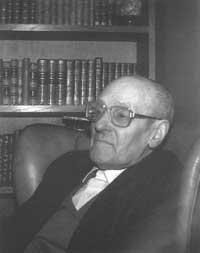
C. Santamaría: It was the time of the dictatorship and anything was prohibited with “Basque” dyes. The pseudonym “separatist” immediately put us who were involved in this kind of tasks. So of those then in power we did not expect anything. We made many efforts and I remember especially Angel Irigarai, who went from one to the other. Although the authorities then allowed us to open the Faculty of Law, they hoped that we would soon have failed. As you can see, things have not been like that.
Elh. : You are Catholic is not secret, but we know you are a special Catholic.
S.G.: I have always participated in Catholic movements. However, I have never been “officialist.” Religious representatives in general are traditionalist and immobile and I have been out of it. Consequently, I have had many misunderstandings with the official church.
As I have been a progressive Catholic, the path adopted in most cases has been that of commitment. However, I have had many relationships with people of different thinking.
Elh. : Following this line, what do you think of liberating theology?
S.G.: It is difficult to make parallels. Even more difficult, because we have lived in such different environments. However, as liberating theology seems attractive to me, I see my head near there.
I have been secretary general and member of the Pax Christi movement. This institution had its headquarters and activities in Paris. We were not absolute pacifists. However, I want to affirm that war is not self-condemning. Injustice at the same time provokes violence and therefore war can make some sense. However, in all incidents we tried to explore ways of peace. During the dictatorship we helped people of different ideologies.
Also in this aspect we have some similarity with those of liberation theology, but we are from different situations and epochs.
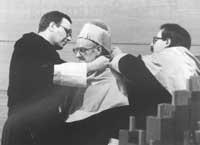
Elh. : Nuclear energy and nuclear war have been very fashionable in recent decades. You have participated in numerous anti-nuclear campaigns, haven't you?
S.G.: For many years we have been exposed to nuclear risk. Now, fortunately, the danger of nuclear war has passed and I am very happy about it. Nuclear war can be terrible for everyone and that is why I have participated in anti-nuclear campaigns.
However, I am not antinuclear, that is, I do not renounce nuclear energy, but in this field I would put many conditions.
Elh. : Studied Exact Sciences. What has been the most interested section in this field?
S.G.: I studied mathematics and worked in mathematics. The “Center for Scientific Studies” published in Donostia “Revista de matemáticas” and I participated in it.
I was a friend of the mathematician José Oñate. He worked axiometry and his goal was to introduce axiomatics into mathematics.
Since mathematics is an extensive science, all mathematicians have some fields more than others. I liked the postulates of basic mathematics, logic and geometry, and that is why I have focused research on mathematics in the sections cited.
However, the most important contribution that mathematics has given me is the method of analyzing things. Scientific methods are not exclusively applied to science. Their application to common problems or projects can result in very rich results.
Elh. : Is there infinite mathematics?
S.G.: In mathematics there are also impossible obstacles and we have to invent something that serves for it. Infinity must be there. Mathematical infinity is not mathematical, but mathematics cannot overcome certain problems without it.
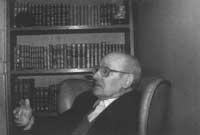
Elh. : And what would you say about time?
S.G.: There are many types of time. We have physical, metaphysical and psychological times. For us the best known is physical time, but we do not know it at all.
Einstein told us that absolute time is not absolute when he wrote the theory of relativity. Although today the correction of this theory is in doubt, enbido is there and many of the ways of thinking and theories that have developed so far are going to be turned upside down.
Yes, time is also relative.
Elh. : As “Consejo General Vasco” he was Minister of Education. Therefore, he has also taken some steps in politics.
S.G.: Yes, I have been an effective and progressive man by nature and thought and thus my political activity is understood.
Between 1978 and 1980 I was Councillor of Education of the Basque General Council. At that time I was from PNV, but when there was division I went to EA. Under this change there was a tendency for progress and progress, and not another. However, neither I nor the party man. The parties associate a lot, both ideological and practical, and as it can be said that I have been free thinker throughout my life, I am not of interest to the parties and neither for me the aspect.
Elh. : As you have also been a thinker, did you know interesting people?
S.G.: There are many people prepared. I have met many people in Euskal Herria and outside of Euskal Herria and it is impossible to remember everyone.
I remember José Miguel Zumalabe and Rikardo Arregi. We had a lot of work and debate together!
I was a friend of Zubiri and Zaragueta. These were, in my opinion, deeper philosophers than Ortega. The Ortega was elegant and dominated the tongue well, but it was not deep in thought.
I know that I forget many names, but the years do not pass in vain and ...
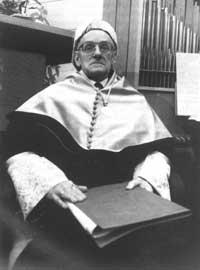
Elh. : He has also taken some steps in education.
S.G.: Although I have always been studying, I have taken some steps in teaching.
When we founded the Liceo Santo Tomás I was a professor.
I had a training academy for engineers. There we taught mathematics and then passed many engineers who have become famous. Among other things I remember Txillardegi.
Elh. : What do you think of democracy and the current moment?
S.G.: Democracy was a word that once felt deep. And what happens today? We have democracy, but we know nothing; power is almost as far as before. It is decided by the parties and there is no information.
On the other hand, social values have changed a lot. Today the most important thing is pragmatism and utilitarianism. Making money is one of the few goals of many. There are no great conflicts and at the same time the lack of illusion is increasingly evident. Ideology occupies less and less space...
Elh. : Ecology has been a concept that has been reinforced in the last decade. What is ecology for you?
S.G.: For me ecology is a basic wisdom. Throughout history we have found and continue to find technical and ecological mentalities. While the former use nature, the latter respect nature.
I see the need for harmonic solutions. We must use nature, but respecting it, because it is terrible that industries are made without ecological criteria.
Therefore, ecology is a way of seeing life and, in addition, a concept that must be extended to all the actions of life. Humanity is understood differently and, as I said before, is a type of wisdom.
I think that is something that should be taught to students in schools.
Elh. : In his day he worked in the meteorological center of Igeldo, right?
S.G.: It's old, but it's true. Yes.
It was time to go to military service and I studied the possibilities of freeing. One of these possibilities was to overcome meteorological oppositions. I finished the meteorology course in Salamanca and finished the first place in the promotion.
Thanks to this opposition I worked in the meteorological center of Igeldo and remember that there I was with Felisa Martín Bravo.
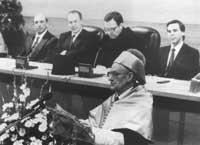
Elh. : The last question must refer to Basque. Will you talk about the relations that the Basque language and Karlos Santamaría have had?
S.G.: In my house I spoke in Basque and Spanish. I studied in Spanish and then became literate.
Since I am aware that I live in Euskal Herria, I wanted to believe that I live in the Basque people. Following this thought, Basque and I have had a constant relationship. I have been a member and promoter of most journals published in Basque; Jakinen, Argian, etc.
In Euskaltzaindia I have also participated in many commissions and groups, especially in the beginning of unified Basque.
It is true that the unified Basque lacks the sweetness of the dialects, but at the same time it is true that the Basque batua is also the Basque created by realism.
Euskera has a long way to go, but if we want to remain Basque opinions, we have to be Euskaldunes.
We had an hour and a half with Mr. Karlos Santamaría and he told us nothing of the awards and mentions he has received and is receiving. On the contrary, he told us that he liked “Por la linea de los científicas” by Elhuyar magazine, that he was writing an article for “Euskaldunon Egunkaria” and that he was reading a couple of books, that is, that he was beginning to think.
Dear Mr. Santamaría and gracias.
Buletina
Bidali zure helbide elektronikoa eta jaso asteroko buletina zure sarrera-ontzian











